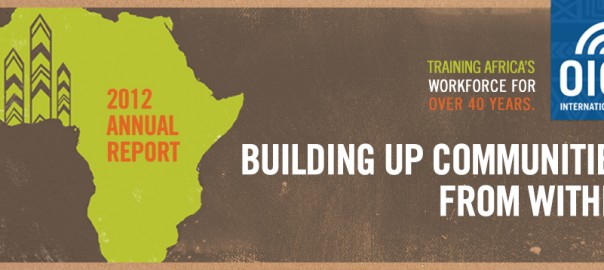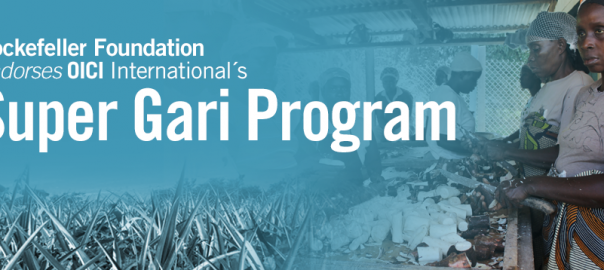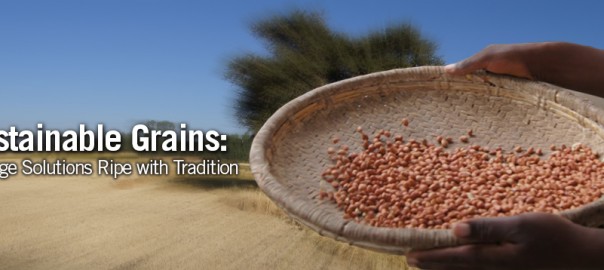Click here to view the report online.
To download the report click here.

Click here to view the report online.
To download the report click here.

In hot, sub-Saharan African climates, perishable food items do not have much of a shelf life, rendering them even more precious. But when processed, many crops can last up to six months.
Cassava, also known as yucca, is a great source of nutrients such as essential carbohydrates and vitamins – necessary elements to fuel hardworking families. However, if not processed within 48 hours of harvesting, farmers can experience as much as 40 percent loss of their cassava crops. Processed as flour or gari (a granular mixture), cassava can be fortified to add nutritional value that especially benefits vulnerable populations who are at great risk of malnutrition or stunting.
![]()
Known as Super Gari, OIC International produces this fortified cereal to include in food rations for program beneficiaries, with the aim of reducing chronic malnutrition. Made locally, Super Gari is comprised of three easily accessible ingredients: cassava gari, defatted soy flour and a micronutrient mixture.
![]()
With funding from the United States Agency for International Development, Office of Food for Peace, OIC International is implementing the Super Gari project in Liberia to take the production of Super Gari one step further by improving the cassava value chain including introducing, testing and bringing the fortified cereal to markets.
Starting at the farm level, OIC International supplies clean planting material and necessary inputs, along with agricultural training for poor farmers. The farmers are then organized into production groups to sell their cassava tubers in bulk to processing facilities that employ women and are owned by OIC affiliates. In return, the processing facilities receive new equipment and additional training to enhance the quality of operations.
Currently in the pre-commercialization phase of the project, OIC International’s Super Gari project team has been exploring various supply chains and distribution channels, with the goal of commercializing Super Gari.
For more information on OIC International’s Super Gari project, click here.
To read the full report, click here.

For poor communities in Ghana, growing enough food for their families is only half the battle. Preventing unnecessary waste due to spoilage and pests poses a real challenge, but at OIC International, we are working alongside poor farmers to tap into a 300-year Ghanaian tradition through our Mud Silos program.
The solution is simple and one that farmers in some areas have used for hundreds of years – a grain storage unit made from local materials. To bring this cost-effective technology to scale, OIC International is working with rural communities to raise awareness of the technology and train local artisans to construct the storage systems.
Here’s why it makes sense:
![]()
Made from local materials such as dried grass and mud, the silos are designed with three compartments that can store several commodities. With good crop/seed treatment, coupled with a lifespan of up to 50 years if well maintained, this makes the system a smart choice for farmers who raise multiple crops.
![]()
To date OIC International has helped rural farmers construct 5,724 mud silos that have the capacity to store up to 1.5 metric tons of grain. OIC International’s research has found that when grains are well dried and treated before storage, the silos yield almost zero percent loss. And for poor families in Ghana, less spoilage means greater food security during the “lean months.”
![]()
In 2001, Ghana’s Ministry of Agriculture evaluated a number of grain storage systems and found that mud silos were the most cost effective and successful method for maintaining the nutritional value of crops while in storage. For less than $25, OIC International’s Mud Silos program helps farmers invest in increasing their own food supplies by reducing spoilage and pests.
![]()
Working alongside poor farmers, OIC International provides the artisan to build the mud silo, while farmers supply the cementing agent, water supply, clay and grass. To date, we have arranged for master builders to train 457 artisans (craftsmen/women) as mud silo construction experts, thus creating a skilled labor force that can generate income in nearby communities.
To read the full report, click here.